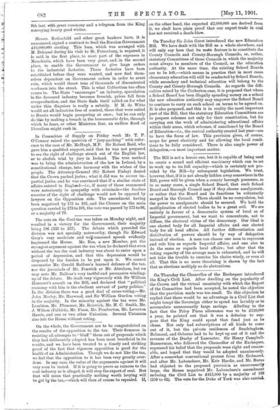The vote on the Coal-tax was taken on Monday night,
and resulted in a victory for the Government, their majority being 106 (333 to 227). The debate which preceded the division was not specially noteworthy, though Sir Edward Grey's very moderate and wetl-reasoned speech evidently impressed the House. Mr. Rea, a new Member, put the strongest argument against the tax when he declared that even without the tax the coal industry was about to enter upon a period of depression, and that this depression would be deepened by the burden to be put upon it. We cannot summarise Mr. Gerald Balfour's learned defence of the tax, nor the jeremiads of Mr. Fenviick or Mr. Abraham, but we may note Mr. Balfour's very tactful and persuasive winding. up of the debate. He dealt very vigorously with Sir William Harcourt's assault on the Bill, and declared that "political economy with him is the obedient servant of party politics." In the division there was a good deal of cross-voting,—Mr. John Morley, Mr. Harwood, and Sir William Gurdon voting in the majority. In the minority against the tax were Mr. Lambton, Mr. Plummer, Mr. Renwick, Mr. H. C. Smith, Mr. J. Wilson (Falkirk), Mr. Fison, Mr. Pemberton, Mr. Leverton Harris, and one or two other Unionists. Several Unionists also left the House without voting.






































 Previous page
Previous page